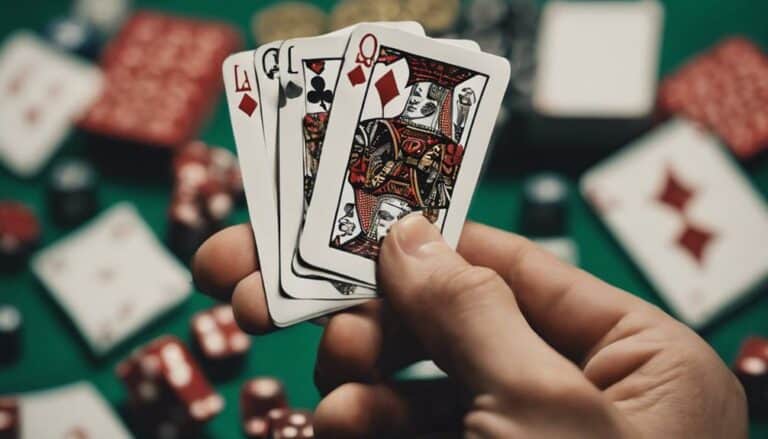Picture a deck of cards, each representing a decision in a relationship. Now, imagine if some players were prone to stacking the deck in their favor.
The correlation between gambling and infidelity raises intriguing questions about trust and loyalty. As you delve into the complexities of this connection, you'll uncover insights that may shed light on the behaviors of those who choose to gamble with more than just their money.
Key Takeaways
- Gambling addiction can lead to emotional detachment and infidelity.
- Cheating tendencies in gamblers stem from thrill-seeking behavior and impulsivity.
- Infidelity may result from seeking excitement and novelty outside the relationship.
- Warning signs of cheating in gamblers include emotional distance and increased secrecy.
Understanding Gambling Behavior
When delving into the realm of understanding gambling behavior, one must consider the intricate interplay of genetics, personality traits, and past experiences that influence an individual's engagement with this activity. Gamblers exhibit a wide range of behaviors, from casual participation to compulsive gambling leading to addiction issues. Personality traits like impulsivity, sensation-seeking, and risk-taking tendencies play a significant role in shaping how individuals approach gambling.
The psychology behind gambling involves complex interactions between brain chemistry, emotions, and learned behavioral patterns. The allure of potential rewards often drives individuals to continue gambling despite experiencing losses, highlighting the powerful impact of reinforcement mechanisms on behavior.
Moreover, the thrill of risk and the hope of winning further contribute to the addictive nature of gambling for some individuals. Understanding these psychological dynamics is crucial in comprehending why some people develop gambling addictions while others can engage in gambling activities without negative consequences. By exploring these factors, researchers can gain valuable insights into how to address and prevent problematic gambling behaviors.
Impact of Gambling Addiction on Relationships
The impact of gambling addiction on relationships manifests through deceitful behaviors like lying and cheating, leading to trust issues and detachment. When struggling with gambling addiction, individuals may face challenges in maintaining healthy relationships with their partners.
Here are four crucial points to consider regarding the impact of gambling addiction on relationships:
- Trust Issues: Financial dishonesty stemming from gambling addiction can erode trust between partners, creating a rift in the relationship.
- Emotional Detachment: Addicts may become emotionally detached from their partners as they prioritize gambling over nurturing their relationship.
- Communication Breakdown: Deceitful behaviors associated with gambling addiction can hinder open communication between partners, making it difficult to address underlying issues.
- Seeking Help: Recognizing the impact of gambling addiction on relationships is the first step towards seeking professional help to rebuild trust, improve communication, and restore intimacy in the relationship.
Psychological Factors Influencing Cheating
Psychological factors such as thrill-seeking behavior and impulsivity play a significant role in influencing cheating behavior among gamblers. These traits can drive individuals to seek excitement and novelty, leading to infidelity as a way to satisfy their need for stimulation. Additionally, gambling addiction can be linked to infidelity, as the compulsive behavior and emotional detachment associated with prioritizing gambling over relationships can contribute to cheating tendencies. Coping mechanisms used to deal with the psychological stress from gambling addiction may also play a part, pushing individuals to seek emotional fulfillment outside the relationship. Moreover, psychological traits commonly found in gamblers, such as narcissism and low empathy, can further exacerbate cheating tendencies by promoting a self-centered focus and a lack of consideration for their partner's feelings.
| Psychological Factors | Examples |
|---|---|
| Thrill-seeking behavior | Seeking excitement elsewhere |
| Impulsivity | Acting without thinking |
| Emotional detachment | Prioritizing gambling over relationships |
Warning Signs of Cheating in Gamblers
Increased secrecy in actions and communication can serve as a crucial indicator of potential cheating behavior in gamblers. When it comes to identifying warning signs of cheating in gamblers, there are several key behaviors to be mindful of:
- Emotional Distance: Gamblers who are cheating may exhibit emotional distance and a lack of interest in spending time together with their partners.
- Decreased Intimacy: A significant decrease in both emotional and physical intimacy could point towards potential cheating behavior in gamblers.
- Changes in Appearance: Watch out for sudden changes in grooming habits and appearance without a clear reason, as this could be a sign of cheating in gamblers.
- Unexplained Absences and Defensive Behavior: Red flags for cheating include unexplained absences and defensive behavior when questioned about their whereabouts or activities.
Rebuilding Trust After Infidelity
Rebuilding trust after infidelity necessitates a foundation of open communication and transparent engagement to address the underlying issues effectively.
In the aftermath of infidelity, it's crucial to prioritize communication in your relationship, allowing both partners to express their feelings, concerns, and needs openly. Seeking professional help, such as therapy or counseling, can provide a structured environment for rebuilding trust and facilitating healing.
Transparency plays a vital role in this process, as honesty and openness create a sense of security and accountability. Reestablishing emotional intimacy is key to repairing the bond that was broken by infidelity, fostering a deeper connection between partners.
Personal growth, through self-reflection and understanding, can aid in rebuilding trust and love after infidelity. Patience, dedication, and compassion from both individuals are essential in overcoming the challenges and rebuilding a strong foundation of trust in the relationship.
Conclusion
In conclusion, the correlation between gambling and infidelity raises intriguing questions about the intersection of behavior patterns in relationships.
While not all gamblers are unfaithful, understanding the psychological factors at play can provide valuable insights into potential challenges.
By recognizing warning signs and fostering open communication, couples can navigate these complexities and rebuild trust after infidelity.
This research-focused approach sheds light on the importance of addressing gambling behavior in relationship dynamics.

